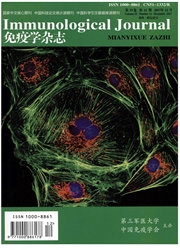

 中文摘要:
中文摘要:
目的研究宫颈癌细胞中人粒细胞巨噬细胞集落刺激因子(GM~CSF)的表达对环氧合酶-2(COX-2)和诱导性一氧化氮合酶(iNOS)表达的影响,探讨GM—CSF在宫颈癌发生发展中的作用。方法收集临床宫颈癌标本52例及正常宫颈15例和宫颈上皮内瘤变(CIN)组织标本21例作为对照进行免疫组织化学染色,分析宫颈癌组织GM—CSF的表达与COX-2和iNOS表达的相关性;为了从细胞水平进一步论证其相关性,本实验使用宫颈癌细胞系Caski细胞,Caski细胞经GM—CSF转染后过表达GM—CSF,并通过RT—qPCR和Westernblot检测COX-2和iNOSmRNA及蛋白的表达情况,以空质粒转染的Caski细胞为对照。在细胞模型中探讨GM—CSF强制表达对COX-2和iNOS表达的影响。同时,通过GM—CSFsiRNA干扰Caski细胞GM—CSF表达后,用Ⅳr_qPCR及Westernblot方法检测iNOS/COX-2mRNA及蛋白表达情况。结果免疫组化结果显示,宫颈癌组织GM—CSF表达明显低于正常组和CIN组(P均〈0.05),而COX-2及iNOS的表达显著高于正常组(P〈0.01),但与CIN组无明显差异;统计学分析发现GM—CSF与COX-2/iNOS的表达呈负相关(r=-0.542/-0.499)。细胞水平结果显示与空质粒转染的细胞相比.转染GM—CSF的Caski细胞COX-2/iNOS在mRNA及蛋白表达水平都有显著下降(P均〈0.05);GM—CSF在被干扰后,干扰组与对照组相比COX-2/iNOS在mRNA及蛋白表达水平有明显差异(P均〈0.05)。结论在组织和细胞表达水平GM—CSF与COX-2/iNOS的表达均呈负相关,GM—CSF可能通过下调COX-2/iNOS表达而具有抗宫颈癌作用。
 英文摘要:
英文摘要:
This study performed to explore the roles of GM-CSF in the occurrence and development of cervical cancer by evaluating the effect of GM-CSF expression on COX-2 and iNOS in cervical cancer cells. Firstly, Immunohistochemieal (IHC) assay was used to detect GM-CSF, iNOS and COX-2 in 52 cervical cancer, 21 cervical intraepithelial neoplasia (CIN) and 15 normal cervical samples, for analyzing the correlation between GM- CSF and COX-2/iNOS. To explore whether GM-CSF over-expression had an effect on COX-2/iNOS in cellular models, Caski cells were introduced and transfected with GM-CSF to improve the expression of GM-CSF, furthermore, the mRAN and protein expression of COX-2 and iNOS were detected with RT-qPCR and Western blot, respectively. In control trial, the expression of GM-CSF was silenced in Caski cells to compare the mRNA and protein expression of COX-2/iNOS. IHC results showed GM-CSF in carcinoma group was decreased (P 〈 0.05) as compared with normal tissues and CIN groups, but the COX-2 and iNOS expression were opposite. And the statistic analysis found that the expression of GM-CSF had a negative correlation with COX-2/iNOS(r=-0.542/-0.499); mRAN expression and protein expression of COX-2 and iNOS were decreased in the cells transfected with GM- CSF(P〈 0.05), and they were increased when GM-CSF was silenced. The results indicated that GM-CSF may play an anti-cervical carcinoma role by decreasing the expression of COX-2/iNOS.
 同期刊论文项目
同期刊论文项目
 同项目期刊论文
同项目期刊论文
 期刊信息
期刊信息
